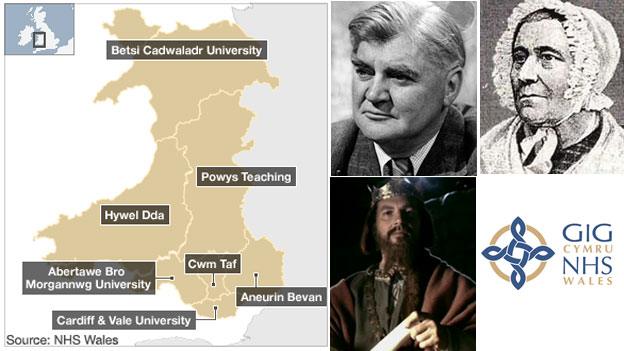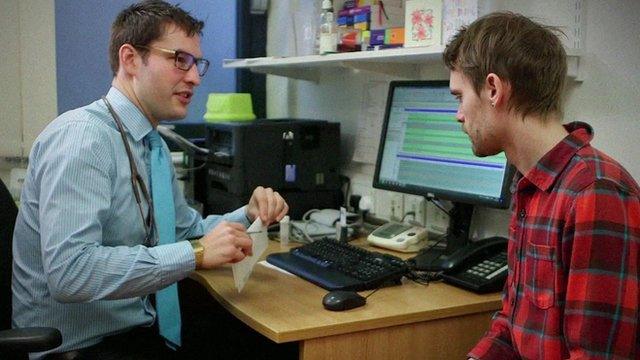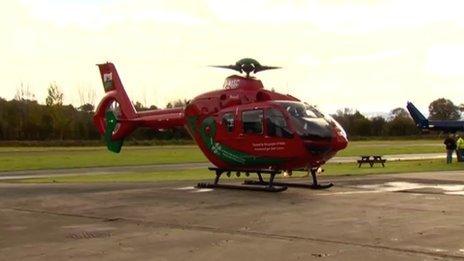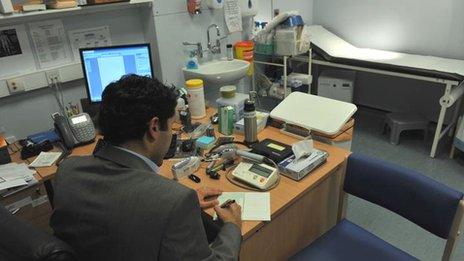Health board name changes in Wales could recruit doctors
- Published
Over 400 junior doctors' posts out of 2,900 in Wales are unfilled
Changing the names of some of Wales' health boards might help solve a shortage of junior doctors.
That is the view of the man in charge of training, with 400 places unfilled.
Prof Derek Gallen believes a perception of Wales is a problem, with junior doctors knowing Cardiff but not sure where Hywel Dda or Betsi Cadwaladr is.
But, Deputy Health Minister Vaughan Gething disagreed, saying changing health boards' names was not the solution to attracting junior medics.
Prof Gallen also says a shortage of junior paediatricians puts pressure on rotas and in turn hits the quality of their training.
As the postgraduate dean for the Wales Deanery, Prof Gallen oversees training for doctors across the country from when they qualify until they become fully fledged GPs or consultants.

Three health boards are named after famous Welsh figures - Aneurin Bevan, Betsi Cadwaladr and Hywel Dda
He says geography and perception of Wales are issues he comes across, and recruiting to north and west Wales is a particular problem.
Prof Gallen also believes some junior doctors think they have to speak Welsh to work here.
"There's a perception they don't understand the geography, that they will have long commutes between trusts on their rotations and that they will have to speak Welsh," he said.
Prof Gallen believes students and junior doctors are struggling to easily identify areas of Wales outside Cardiff and the Vale due to the health board names.
People in north Wales were asked if they knew which health board area they lived in
"When you're applying for jobs you'd have to work quite hard to find out where that is in Wales, and what it's near, so that is certainly an issue.
"In a collective sense it's difficult for people to know the whole of the Pembrokeshire coast is Hywel Dda. Most of middle class England holiday here but there's a perception they don't want to work and live here - and the work-life balance is fantastic.
'Best people'
"It would be good to try [changing the names] to see if would make a difference."
However Mr Gething disagreed, saying training was the key factor in attracting junior doctors.
"Junior doctors look at the quality of training opportunities as the biggest factor on whether they're going to go and train somewhere," he said.
"That has to be the primary focus for the NHS in Wales."
After they qualify from medical school many junior doctors return home, or gravitate towards the big hospitals of London.
Prof Derek Gallen says a name change is worth trying if it helps recruitment
So to compete, Prof Gallen argues the NHS in Wales needs to prove it can provide better training than elsewhere.
There are worries of a vicious circle existing in some specialist areas - like paediatrics - with shortages of junior doctors meaning they are pressed hard on to rotas, leaving less time to study.
It has led to "unacceptably low" exam results in the specialism.
Three years ago, the imbalance in training and having to care for patients saw junior doctors withdrawn from places at one south Wales hospital - with medical wards forced to close.
Dr Phil Banfield, chair of the British Medical Association in Wales, said that situation could happen again.
He told BBC Wales that there are "discussions going on daily" on how to cover rotas as trainees are moved around hospitals.
"There's a potential collapse of service in as little as six weeks time," he warned.
Prof Gallen said the pressures facing junior doctors adds to the argument to centralise more specialisms.
He told BBC Wales that in order to compete with popular places like London, Wales needs to offer better experience for junior doctors.
He argues that plans to centralise some specialist services at fewer large hospitals need to go further.
There are currently 400 vacancies for the 2,900 places in Wales, with the problem worse beyond the M4 corridor.
But quality is still more important than quantity.
"Filling the posts is secondary to filling them with the best people," said Prof Gallen.
"I'd have fewer and better rather than filling all 2,900 posts."
The Welsh government said it invests more than £350m supporting more than 15,000 students studying a range of health-related programmes.
"We are committed to working with Welsh NHS organisations and others such as the Deanery to continue to recruit and retain staff," a spokesman added.
- Published24 January 2015

- Published5 June 2013

- Published2 November 2014

- Published27 November 2014
